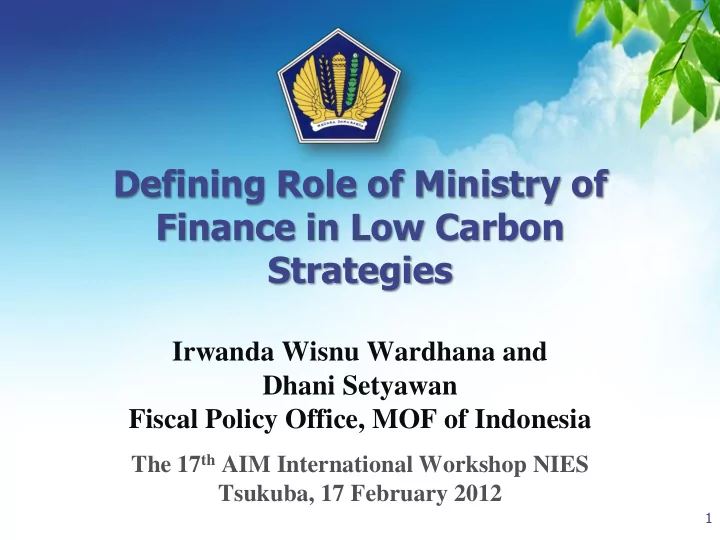

Defining Role of Ministry of Finance in Low Carbon Strategies Irwanda Wisnu Wardhana and Dhani Setyawan Fiscal Policy Office, MOF of Indonesia The 17 th AIM International Workshop NIES Tsukuba, 17 February 2012 1
Outline 1. Introduction 2. Policy Instruments Options 3. Policy Instruments Options: Financing 4. Incorporate Fiscal Policy Measures into the AIM Modeling 5. Conclusions
Introduction 1. Primary national development target: pro- growth, pro-poor, pro-job, and pro-environment 2. Indonesia needs to grow to promote jobs & alleviate poverty 3. At the same time, we are committed to mitigation and adaptation on climate change and low carbon economic development 4. We believe that fiscal policy can be very powerful in achieving this end and linking solutions with development path
Policy Instruments Options Ministry of Finance’s policy instruments: 1. Domestic Financial and Investment Sector Policies. 2. Fiscal Policy Instruments (Taxes, subsidies and related instruments). 3. Expenditure and Budget Policies. 4. Direct Regulation. 5. International Flows of Funds and Investment.
Ministry of Finance Policy Instruments to Influence Low Carbon Economic Development Management of Can influence: • Investment climate • Incentives • Pricing (fiscal) policies • Investments • Direct spending • Industry • Risk and financial markets • Int’l Financial Flows • Sector rules & law • Pro Poor Approaches Financial/ Budget/ Expenditure Direct Regulation Fiscal Policies Investment Policies Policies • Enforcements/ • Tax/Fees/ Charges • Investment Climate • Budget Priorities Incentives • Royalties/Rents • Zoning/Land Use • Banking Sector/ Non • Direct Investment • Subsidies/Tax breaks • Environmental Bank Finance • Green Procurement • Relative Prices/ Institutions Management • Education Awareness Incentives • Local Government • Building/ Design • Emissions trading Finance Rules Standards • Emission Standards
Policy Instruments Options: Financing Ministry of Finance role in financing side: 1. Enabling the environment for private sector investments. 2. Condition of access to international financing 3. Distribution Mechanisms of funds within the country: Mitigation 1. Adaptation 2. Compensation 3.
Role for Ministers of Finance in Climate Change Capitalizing on Private and Public Financial Flows Int ’ l Investment / Funds Flows Int ’ l Investment / Funds Flows Private Sector Financial Flows • IFIs, ODA flows • IFIs, ODA flows • Carbon markets: CDM, REDD (potential) • Carbon markets: CDM, REDD (potential) • Project investments & financing • Global Environment Facility • Global Environment Facility • Public Private Partnerships • Adaptation Fund • Adaptation Fund • Debt for Development (or nature) swaps • Debt for Development (or nature) swaps • Domestic & int ’ l capital mkts ROLE OF GOV ’ T Private Sources Public Sources Ministry of Finance “ Enabling Investment “ Conditions of • Institutional Framework Conditions ” Access ” • Policy Enabling Conditions • Distribution Mechanisms Uses of Funds “ Conditions of Allocation ” MITIGATION COMPENSATION ADAPTATION • Investment Projects • To agents or firms • Environ. Adjustments • Governance Actions • For behavior change • Infrastructure Investmnts • Projects & Program • For opportunities lost • Projects & Programs
Incorporate Fiscal Policy Measures into the AIM Modeling 1. How the AIM modeling could incorporate a fiscal policy action and measure which change the economic market structure? 2. E.g. Shifting the fuel subsidies to other forms of subsidies: Investment incentives on renewable energy development Agriculture subsidies Cash transfer 8
Conclusions 1. Ministry of Finance’s authority in the fiscal policy side should be utilized in a more optimum way. MOF involvement in Low Carbon Strategies is INDISPENSABLE. 2. AIM Modeling might be improved to put more attention on fiscal policy measures. 3. To ensure the implementation effectiveness in national level, Low Carbon Strategies should be treated as an integrated economic policy rather than an environmental issue alone.
Thank You Center for Climate Change Financing and Multilateral Policy, Fiscal Policy Office Radius Prawiro, 6 th floor, Dr. Wahidin Raya No. 1 Street, Jakarta, Indonesia 10710 Ph. +6221-3431675 Fax. +6221-34831677 Email: irwanda.wisnu@fiskal.depkeu.go.id dsetyawan@fiskal.depkeu.go.id 10
Recommend
More recommend